ptsd

 My niece, Kayla Stevens is mom to two beautiful daughters, Elliott and Maya, who arrived just under a year ago, on June 24, 2022. With her husband, my nephew, Garrett Stevens and the girls, Kayla is as happy as she can be!! She and Garrett are living their best life, watching their kids growing up and learning so many new things. Kayla and Garrett really enjoy taking their girls to the park, now that nicer weather has arrived. Of course, Elliott is in a number of activities now, so they all stay pretty busy.
My niece, Kayla Stevens is mom to two beautiful daughters, Elliott and Maya, who arrived just under a year ago, on June 24, 2022. With her husband, my nephew, Garrett Stevens and the girls, Kayla is as happy as she can be!! She and Garrett are living their best life, watching their kids growing up and learning so many new things. Kayla and Garrett really enjoy taking their girls to the park, now that nicer weather has arrived. Of course, Elliott is in a number of activities now, so they all stay pretty busy.
Kayla has always been a kind and compassionate lady. That really makes her perfect for her career as a social worker, working at the Veterans’ Administration. Really, that is a unique 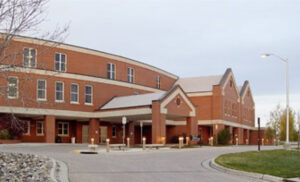 kind of job. Many veterans have been through so much, it helps to have people who understand the stressors, and are there to help with it. Things like PTSD, have become so well known in recent years, but for years veterans, like anyone who is facing something like that, felt like they had no one to turn to. With Kayla’s kind heart they can feel less alone now. I know that the parameters of Kayla’s job have changed over the years, and now she works from home, but that has not stopped the sweetness of this lady from shining through to these people she works with every day.
kind of job. Many veterans have been through so much, it helps to have people who understand the stressors, and are there to help with it. Things like PTSD, have become so well known in recent years, but for years veterans, like anyone who is facing something like that, felt like they had no one to turn to. With Kayla’s kind heart they can feel less alone now. I know that the parameters of Kayla’s job have changed over the years, and now she works from home, but that has not stopped the sweetness of this lady from shining through to these people she works with every day.
I know that her kindness is in a big way, what drew Garrett to Kayla in the first place. Garrett and Kayla were 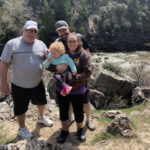
 introduced by his sister, Lacey Stevens, but it was Kayla who won his heart. Nothing more was needed, once they met, because they knew that their life was real. Now after being married for eight years and having two beautiful daughters, they are happier than ever. The only sad part for the family here in Casper is that they live in Sheridan, and we don’t get to see them as often as we would like. Nevertheless, Kayla is good about sending us lots of pictures and videos of the kids. That really helps. Today is Kayla’s birthday. Happy birthday Kayla!! Have a great day!! We love you!!
introduced by his sister, Lacey Stevens, but it was Kayla who won his heart. Nothing more was needed, once they met, because they knew that their life was real. Now after being married for eight years and having two beautiful daughters, they are happier than ever. The only sad part for the family here in Casper is that they live in Sheridan, and we don’t get to see them as often as we would like. Nevertheless, Kayla is good about sending us lots of pictures and videos of the kids. That really helps. Today is Kayla’s birthday. Happy birthday Kayla!! Have a great day!! We love you!!
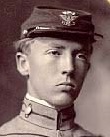
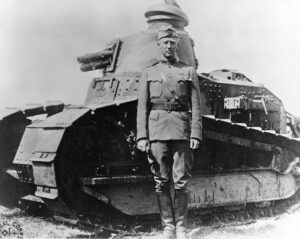 There are men of war, and then there are men of war. United States General George S Patton was the latter…meaning that he almost lived for war. Patton was a man who came from a long line of military people, and while he wasn’t always a tactful man, he was a great warrior…a fact that he proved over and over again. Many people didn’t like him much, but they couldn’t deny his capabilities. Patton was a great leader, but he wasn’t really a people person, and that got him in some trouble.
There are men of war, and then there are men of war. United States General George S Patton was the latter…meaning that he almost lived for war. Patton was a man who came from a long line of military people, and while he wasn’t always a tactful man, he was a great warrior…a fact that he proved over and over again. Many people didn’t like him much, but they couldn’t deny his capabilities. Patton was a great leader, but he wasn’t really a people person, and that got him in some trouble.
George Smith Patton Jr, who was born to George Smith Patton Sr and his wife, Ruth Wilson, the daughter of Benjamin Davis Wilson on November 11, 1885, in San Gabriel, California. Maybe because of his family history, or maybe it was just him, but Patton never seriously considered a career other than the military. At the age of seventeen he tried for an appointment to the United States Military Academy at West Point, New York. He also applied to several universities with Reserve Officer’s Training Corps programs, and was accepted to Princeton College, but eventually decided on Virginia Military Institute (VMI), which his father and grandfather had attended. Later, after studying at West Point, he served as a tank officer in World War I. Patton loved the tank, and his time as a tank officer, as well as his military strategy studies led him to become an advocate of the crucial importance of the tank in future warfare. When the United States entered World War II, Patton became the logical choice for the command of an important US tank division, and his division played a key role in the Allied invasion of French North Africa in 1942. Then, in 1943, in the Allied assault on Sicily, Patton and the US 7th Army in its assault on Sicily and won fame for out-commanding Montgomery during their pincer movement against Messina. Patton loved competition, and this was his chance to shine. On August 17, 1943, Patton and his 7th Army arrived in Messina several hours before British Field Marshal Bernard L Montgomery and his 8th Army, winning the unofficial “Race to Messina” and completing the Allied conquest of Sicily.
Although Patton was one of the most capable American commanders in World War II, he was also one of the most controversial. Patton was a “pull yourself up by your bootstraps” kind of guy, and therefore had no personal understanding of fear or fatigue. PTSD, battle fatigue, or shell shock were conditions he could not accept in anyone. In fact, they infuriated him so much that he actually slapped two soldiers who were suffering with the conditions. During the Sicilian campaign, Patton generated considerable controversy when he accused a hospitalized US soldier suffering from battle fatigue of cowardice and then personally struck him across the face. The famously profane general was forced to issue a public apology and was reprimanded by General Dwight Eisenhower. They would have liked to “walk away” from Patton, but when it came time for the invasion of Western Europe, Eisenhower couldn’t find a general as formidable as Patton, so, once again Patton was granted an important military post. In 1944, Patton commanded the US 3rd Army in the invasion of France. Then, in 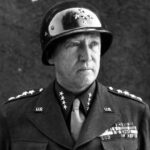
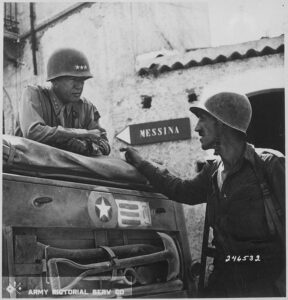 December of that year Patton’s great expertise in military movement and tank warfare helped to crush the German counteroffensive in the Ardennes.
December of that year Patton’s great expertise in military movement and tank warfare helped to crush the German counteroffensive in the Ardennes.
During one of his many successful campaigns, General Patton was said to have declared, “Compared to war, all other forms of human endeavor shrink to insignificance.” Patton died in a hospital in Germany on December 21, 1945, from injuries sustained in an automobile accident near Mannheim. He was just 60 years old.
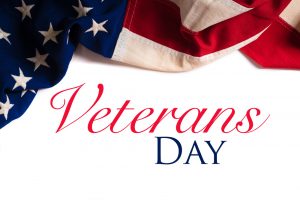 Our Veterans…the cream of the crop. The strong and the brave. Those ones, with courage to last for days. We really cannot say enough about our brave fighting mem and women, who are willing to give up time with family and friends, to go out and fight, sometimes giving their lives so that other people…often unknown to them can live free. There should be a day to honor them. How could we not have such a day? It would be unthinkable. And so, today, we honor them. Those who served and came home again…some to face disability, PTSD, and sadness over the ones who didn’t make it home. We honor them, because they did what we were unable to do. While we sit at home, hopefully praying for our fighting men and women, they bravely took to the battleground, in the air, on land, and sea. Yes, not all served in wartime, but at any moment, all of them knew that it could become wartime.
Our Veterans…the cream of the crop. The strong and the brave. Those ones, with courage to last for days. We really cannot say enough about our brave fighting mem and women, who are willing to give up time with family and friends, to go out and fight, sometimes giving their lives so that other people…often unknown to them can live free. There should be a day to honor them. How could we not have such a day? It would be unthinkable. And so, today, we honor them. Those who served and came home again…some to face disability, PTSD, and sadness over the ones who didn’t make it home. We honor them, because they did what we were unable to do. While we sit at home, hopefully praying for our fighting men and women, they bravely took to the battleground, in the air, on land, and sea. Yes, not all served in wartime, but at any moment, all of them knew that it could become wartime.
I can’t say what it is that makes a soldier, because each probably has their own reasons for enlisting, but 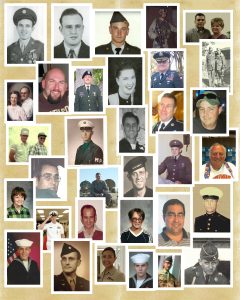 before they become a soldier, each has to make a decision that they will serve their country and willingly go wherever they are told, often without having a say in the matter. Some assignments are great, taking the soldier and family to exotic places, but some are so dangerous that the soldier cannot take his/her family along because it would be unsafe for them. Still, dangerous or not, the soldier bravely goes, and tries to be a credit to his/her uniform.
before they become a soldier, each has to make a decision that they will serve their country and willingly go wherever they are told, often without having a say in the matter. Some assignments are great, taking the soldier and family to exotic places, but some are so dangerous that the soldier cannot take his/her family along because it would be unsafe for them. Still, dangerous or not, the soldier bravely goes, and tries to be a credit to his/her uniform.
I am very proud of our veterans. They have served this country proudly. They took orders when they knew it could mean they lose their lives. That is a rare thing these days, when civil unrest is the norm. Many people would never consider a life or even an enlistment period, because they don’t think they would be appreciated. They don’t want to risk coming home only to be vilified, when in reality, they are the heroes. Veterans Day is a day to celebrate the soldiers who faced it all, and came back home to their families. To all of you…thank you for your service, and Happy Veterans Day!!
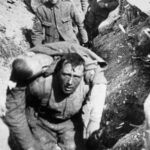 War is an ugly business, and the men and women who fight in wars are subjected to great stress and anxiety. These days, most of us recognize the term, PTSD (Post Traumatic Stress Disorder). We also recognize that a person doesn’t have to be in a war situation to have PTSD. Any traumatic event can trigger PTSD, and the symptoms of this disorder can be devastating. In fact, PTSD can result in things like suicide, attacks on others, institutionalization, or isolation.
War is an ugly business, and the men and women who fight in wars are subjected to great stress and anxiety. These days, most of us recognize the term, PTSD (Post Traumatic Stress Disorder). We also recognize that a person doesn’t have to be in a war situation to have PTSD. Any traumatic event can trigger PTSD, and the symptoms of this disorder can be devastating. In fact, PTSD can result in things like suicide, attacks on others, institutionalization, or isolation.
During World War II, PTSD (then known as Shell Shock) first came to the attention of the military leaders. On October 4, 1944, General Dwight D Eisenhower distributed to his combat units a report by the US Surgeon General that revealed the hazards of prolonged exposure to combat. The then General’s report read, “[T]he danger of being killed or maimed imposes a strain so great that it causes men to break down. One look at the shrunken, apathetic faces of psychiatric patients…sobbing, trembling, referring shudderingly to ‘them shells’ and to buddies mutilated or dead, is enough to convince most observers of this fact.” General Eisenhower had been on the battlefield, and so, knew firsthand of the “attacks” on the minds and emotions of these poor soldiers.
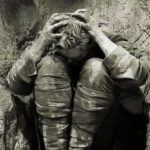
After evaluation of many cases of “Shell Shock” in the hospital wards, the American commanders came to the conclusion that the average soldier could last about 200 days in combat before suffering serious psychiatric damage. They looked into the fact that British commanders used a rotation method, pulling soldiers out of combat every 12 days for a four-day rest period, thereby enabling British soldiers to put in 400 days of combat before being deleteriously affected. The Surgeon General’s report went on to lament the fact that a “wound or injury is regarded, not as a misfortune, but a blessing.” Now, when a wound is considered a blessing, you know that things have taken a serious turn for the worst in the area of morale. That basically means that the soldiers will do just about anything to get off the battlefield. For them, death isn’t far from being acceptable either. General Eisenhower and the military leaders of that era could see that the war was clearly taking a toll on more than just men’s bodies. The far greater toll was on their minds and emotions.
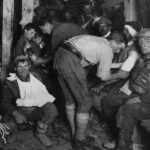 While I can see that the idea of a rotation, or a limited period of exposure to the battlefield could sound like a viable solution, in reality is is only a partial solution, and one that probably won’t really work. While the time spent on the battlefield can cause fatigue, both mentally and physically, it only takes one event to change the mental status of a person. Even a strong person is going to be effected by the horrific death of a comrade at the hands of a land mine. Yes, their own wounds would get them off the battlefield, but that will not take away the pictures of blood and death they have see on the battlefield. To take the soldiers off the battlefield after 200 days is a noble effort, but it is not likely to solve the problem of Shell Shock in the way that they had hoped. I guess that main thing is that they knew about it and were trying to fix it.
While I can see that the idea of a rotation, or a limited period of exposure to the battlefield could sound like a viable solution, in reality is is only a partial solution, and one that probably won’t really work. While the time spent on the battlefield can cause fatigue, both mentally and physically, it only takes one event to change the mental status of a person. Even a strong person is going to be effected by the horrific death of a comrade at the hands of a land mine. Yes, their own wounds would get them off the battlefield, but that will not take away the pictures of blood and death they have see on the battlefield. To take the soldiers off the battlefield after 200 days is a noble effort, but it is not likely to solve the problem of Shell Shock in the way that they had hoped. I guess that main thing is that they knew about it and were trying to fix it.
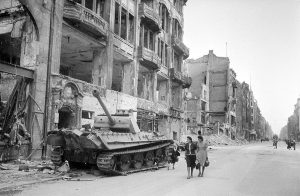 World War II took it’s toll on many people. The soldiers, families at home, and probably unknown to the people of the Allied nations…the German people. When we think of the Nazis, we think of an entire country so filled with hate for the Jewish people…as well as any nationality that was different that the Nazi white people. The reality is that while there were a relatively small number of Hitler’s puppets to actually embraced the thinking and the hatred of Hitler; there were also a great many of the German people who were not Nazis, nor did they agree with anything that Hitler did or believed. They were good and decent people, who valued life, and just wanted to work hard, and live their lives in peace and happiness.
World War II took it’s toll on many people. The soldiers, families at home, and probably unknown to the people of the Allied nations…the German people. When we think of the Nazis, we think of an entire country so filled with hate for the Jewish people…as well as any nationality that was different that the Nazi white people. The reality is that while there were a relatively small number of Hitler’s puppets to actually embraced the thinking and the hatred of Hitler; there were also a great many of the German people who were not Nazis, nor did they agree with anything that Hitler did or believed. They were good and decent people, who valued life, and just wanted to work hard, and live their lives in peace and happiness.
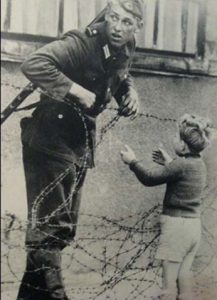
These post-war German citizens were faced with a new and strange kind of post-war reality. The country suffered from collective PTSD. Said one German citizen, “We were a broken, defeated, extinguished people in 1045. 60 million human beings suffered from PTDS. And Knowing that not only did you lose…but also that you were on the wrong side. On the wrong side of morality, of humanity, of history. We were the bad guys. There was no pride. Just the knowledge that we were at rock bottom, and rightfully so.”
As American and Allies, it is hard for us to accept their feelings of remorse. I’m sure that the Jews, Gypsies, and other persecuted races had an even harder time feeling bad for the German people…at least, not unless they were some of the German citizens who escaped from Germany along with other refugees, or those who helped their Jewish or Gypsy counterparts to escape or to survive. One of those sympathizers who lived, warned his children and grandchildren, saying, “Don’t forget, but don’t tell anyone about this.” He was so ashamed and so angry, still, 40, 50 years 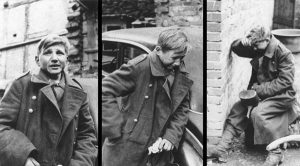 later. He said that the Nazis had taken the best years of his life, saying, “We must look out for them, it can happen again. Beware, pay attention to politics! Speak up! We couldn’t stop them, maybe you can, next time.” The man hammered these things into his grandchild’s brain, over and over and over. He knew the dangers of complacency where politics is concerned. He knew that if they take your guns you are helpless. He knew that if evil people get in office, the danger grows exponentially. He had seen it…first hand. It is a lesson many people today need to learn. It could happen again, if we aren’t vigilant.
later. He said that the Nazis had taken the best years of his life, saying, “We must look out for them, it can happen again. Beware, pay attention to politics! Speak up! We couldn’t stop them, maybe you can, next time.” The man hammered these things into his grandchild’s brain, over and over and over. He knew the dangers of complacency where politics is concerned. He knew that if they take your guns you are helpless. He knew that if evil people get in office, the danger grows exponentially. He had seen it…first hand. It is a lesson many people today need to learn. It could happen again, if we aren’t vigilant.

